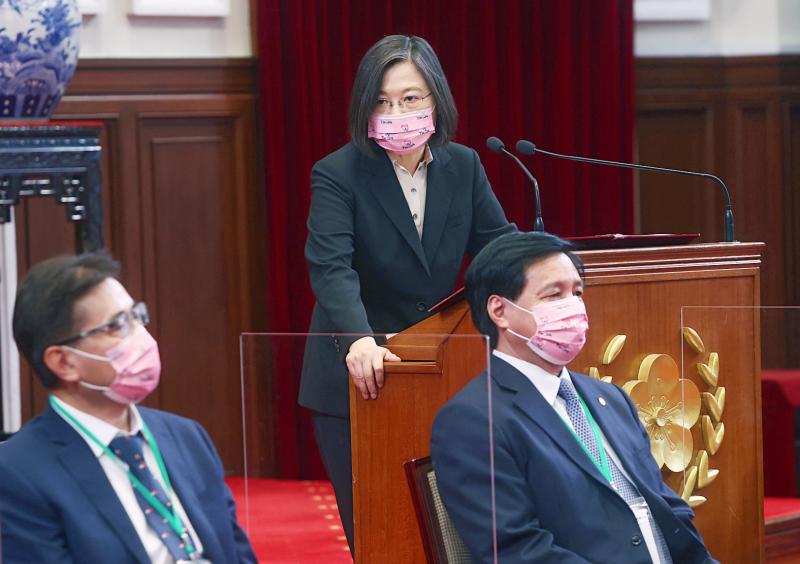Taiwan is committed to defending itself if its democracy is threatened, President Tsai Ing-wen (蔡英文) said yesterday, warning of “catastrophic consequences” if it were to fall to China.
Framing cross-strait tensions as a contest between authoritarian and liberal regimes, Tsai wrote in an article in Foreign Affairs magazine that Taiwan “is a liberal democracy on the frontlines of a new clash of ideologies,” but remains committed to “democratic, progressive values.”
“A failure to defend Taiwan would not only be catastrophic for the Taiwanese; it would overturn a security architecture that has allowed for peace and extraordinary economic development in the region for seven decades,” she wrote.

Photo: CNA
Highlighting Taiwan’s geopolitical relevance, Tsai said a military force that has broken the first island chain would be in a position to disrupt international trade and destabilize the western Pacific region.
Beijing’s ambitious foreign policy in recent years is driven not solely by national interest, but also by ideology, Tsai said.
“Emerging from the COVID-19 pandemic, authoritarian regimes are more convinced than ever that their model of governance is better adapted than democracy to the requirements of the 21st century,” she wrote.
“This has fueled a contest of ideologies, and Taiwan lies at the intersection of contending systems,” she added.
Vibrantly democratic and Western, yet influenced by a Chinese civilization and shaped by Asian traditions, Taiwan, by virtue of both its very existence and its continued prosperity, represents at once an affront to the narrative and an impediment to the regional ambitions of the Chinese Communist Party, she said.
“The great majority of us regard democracy as the best form of government for Taiwan and are willing to do what is necessary to defend it,” she wrote.
“Those beliefs are tested every day, but there is no doubt that the people would rise up should the very existence of Taiwan be under threat,” she added.
“A fundamental part of this embrace of democracy is a firm belief that the future of Taiwan is to be decided by the Taiwanese through democratic means,” she said.
Tsai reiterated that her administration welcomes dialogue with China as long as it is conducted in the spirit of equality and without preconditions.

Right-wing political scientist Laura Fernandez on Sunday won Costa Rica’s presidential election by a landslide, after promising to crack down on rising violence linked to the cocaine trade. Fernandez’s nearest rival, economist Alvaro Ramos, conceded defeat as results showed the ruling party far exceeding the threshold of 40 percent needed to avoid a runoff. With 94 percent of polling stations counted, the political heir of outgoing Costa Rican President Rodrigo Chaves had captured 48.3 percent of the vote compared with Ramos’ 33.4 percent, the Supreme Electoral Tribunal said. As soon as the first results were announced, members of Fernandez’s Sovereign People’s Party

MORE RESPONSIBILITY: Draftees would be expected to fight alongside professional soldiers, likely requiring the transformation of some training brigades into combat units The armed forces are to start incorporating new conscripts into combined arms brigades this year to enhance combat readiness, the Executive Yuan’s latest policy report said. The new policy would affect Taiwanese men entering the military for their compulsory service, which was extended to one year under reforms by then-president Tsai Ing-wen (蔡英文) in 2022. The conscripts would be trained to operate machine guns, uncrewed aerial vehicles, anti-tank guided missile launchers and Stinger air defense systems, the report said, adding that the basic training would be lengthened to eight weeks. After basic training, conscripts would be sorted into infantry battalions that would take

GROWING AMBITIONS: The scale and tempo of the operations show that the Strait has become the core theater for China to expand its security interests, the report said Chinese military aircraft incursions around Taiwan have surged nearly 15-fold over the past five years, according to a report released yesterday by the Democratic Progressive Party’s (DPP) Department of China Affairs. Sorties in the Taiwan Strait were previously irregular, totaling 380 in 2020, but have since evolved into routine operations, the report showed. “This demonstrates that the Taiwan Strait has become both the starting point and testing ground for Beijing’s expansionist ambitions,” it said. Driven by military expansionism, China is systematically pursuing actions aimed at altering the regional “status quo,” the department said, adding that Taiwan represents the most critical link in China’s

EMERGING FIELDS: The Chinese president said that the two countries would explore cooperation in green technology, the digital economy and artificial intelligence Chinese President Xi Jinping (習近平) yesterday called for an “equal and orderly multipolar world” in the face of “unilateral bullying,” in an apparent jab at the US. Xi was speaking during talks in Beijing with Uruguayan President Yamandu Orsi, the first South American leader to visit China since US special forces captured then-Venezuelan president Nicolas Maduro last month — an operation that Beijing condemned as a violation of sovereignty. Orsi follows a slew of leaders to have visited China seeking to boost ties with the world’s second-largest economy to hedge against US President Donald Trump’s increasingly unpredictable administration. “The international situation is fraught